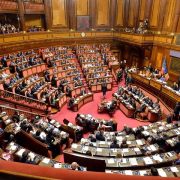The National People’s Congress, which will convene for its plenary session this week, will pass a new constitutional reform to abolish the two-term limit for China’s president. The reform will create a special role and power for Xi Jinping, who will be elected for the second consecutive five-year term. In 2023 he could then continue, if he reelected, to be president. China could be at the crossroads between a new dictatorship and imposing political reform, and as the country is the second-largest economy in the world, with the drive to replace the USA as the number-one economy, the impact of such a decision would be felt by anybody on the planet.
Here there are two stories that touch each other, and yet are not perfectly the same; one is internal and one international.
Let’s start with the international one.
A century ago, in 1917, Russia was taken over by the Leninist revolution, which soon spun its rightist offspring, the fascist or national socialist dictatorships, that led everybody to World War II. In its lasting incarnation as Soviet Republics in Moscow and Eastern Europe, it tried to conquer the world during the Cold War. It failed with the dissolution of the USSR in 1992.
The success, although temporary, of the fascist or communist dictatorships was also due to the faults of the liberal democracies of the time. Great Britain, France, and Germany, the leading forces for war in 1914, were the most liberal and democratic countries in Europe, and yet took millions to slaughter.
It was then easy for communists or fascists to show that democracy was just window dressing for aristocracies, set on expanding their interests and ready to betray the rest of the nation (as fascists in Germany and Italy said) when it was convenient. That is, the leading classes of Europe lost touch with the needs and concerns of the common people, who then stopped believing in them and sought something else—the “fake news” of the time peddled by fascists and communists. Democracies were branded “plutocracies,” ruled by money, that would keep poor people out.
It all came from a century ago
A century later, the world seems again enthralled by the Russian political experiment, this time brought about by its president, Vladimir Putin. He is authoritarian but not as repressive as Stalin; he wants state control, but doesn’t persecute religion and, on the contrary, promotes it. Looking at him from a Russian historic perspective he could be more like Peter the Great: a firm hand on the country, but a grand vision for the nation. It is no universal answer, as communism and fascism were both trying to impose a new global order. But there is a source of inspiration for everyone: seek benefit for your nation and your people before other nations and people.
Putin’s charm goes beyond his internet trolls and the open or occult propaganda campaigns. Present U.S. president Donald Trump he looks up to Putin, while he also shows his annoyance with the trappings of democracy. And Trump is not alone in this appreciation. In fact there are signs that stronger leaders are emerging almost everywhere.
In India, Narendra Modi is concentrating power because he feels this is the only way he can push necessary changes in his country. In Japan, Prime Minister Shinzo Abe cuts a stronger profile than his predecessors, and Europe is not free of these allegations. The unelected officials of the European Union are accused of running the E.U. behind the curtains, and Germany is often portrayed as the occult ruler of the Union.
The vaunted freedom and democracy of the internet is turning into its opposite. A few very large platforms dominate and shape the information flow everywhere, unbridled by any state regulations and pushing their clients into some form of control. No wonder common people feel the stress and react by believing any kind of “fake news”: authorities take advantage of their position, are no longer responsible, and thus are no longer authoritative.
These people actually operate in very different situations, and the rules of Germany and the E.U. bureaucrats are very different from those of Trump or Modi. But common people’s fascination with strong leaders and their mistrust in “traditional” democracies have deep reasons.
Democracy in ancient Athens, with its 3,000 citizens can’t be the same think as in modern countries of 300 million people. Moreover, the role of unelected bureaucracies, selected on the grounds of merit is bound to expand to give stability and efficiency to a country. Large collection of data, while dangerous in many ways, is driving a new technological revolution.
Unfortunately, all of this has not gone hand in hand with reshaping the nature of democratic representation to check on the risks of more powerful information pulls from bureaucracies or networks. This has also hindered on an essential features of democratic countries – the possibility of social turnover and change. Upwards mobility for the less fortunate seems stopped by aristocracies that rule in the name of democracies but are keen on preserving their privileges.
In this way it looks as if democracies are becoming detached from the interests of the common people, and are turning themselves into new nobilities committed just to safeguarding their tiny benefits. Hillary Clinton, looking haughty, was perhaps the symbol of it all, but she has a lot of imitators, people like her around the world.
The turning point was the 2008 financial crisis. Millions lost their savings and had their lives thrown to the wolves, and yet the global financial system did not change the society, didn’t throw to the wolves the culprits who brought havoc to the world; and the poor have become poorer since and the rich richer. Yes, a depression like the one in 1929 was avoided, but apparently it was at the cost of a deepening social divide and rewarding, with new riches the financial institution that created all of that. Maybe there are also good reasons for this, but they were not explained. Meanwhile real estate prices and stock performances boom everywhere, leading to concerns about a new bigger bubble about to burst now or in a few years.
The great China shock of 2008
The 2008 U.S. financial crisis was a huge shock for China as well. Before it, China was roughly 90% convinced it should reform its economic system to be like the U.S. and 50% convinced to go for an American-style democracy. After the crisis, Beijing doubted both the economic and political systems of the U.S. This shock was also due to China’s sometimes blind admiration for America: it was a model; if the model failed, then it was no longer a model.
This kind of disenchantment was similar to what Chinese reformers felt after World War I. Liang Qichao, for instance, wanted to change the Qing imperial system into some kind of Japanese or English system at the end of 19th century, but two decades later, right after the communist uprising in Moscow, was praising the Soviet revolution, considered the latest stage of political evolution.
After 2008, in fact, Putin’s popularity similarly increased in China. This may also have to do with China’s constant strive to leapfrog to the newest technology, the newest fashion, and the newest thing, because the country doesn’t want to be left behind.
However, this temptation to leapfrog might not be too healthy. In the 1920s, the Chinese fascination with the communists led the country to waste decades on a failing model, and the Chinese missed out on the ability of liberal democracies to correct themselves, aside from their gross failings.
This is what happened in the end. In the face of stark choices, after the 1950s, liberal democracies changed, by taking care of the common people and becoming more “social democratic.” That is, what really counts in the long run is not the ability to make the right choices, but the possibility of recovering from mistakes, because mistakes always happen, and if you are not prepared, they can be ruinous. Hannibal and Napoleon won all the battles, but eventually lost the war by losing a single encounter respectively in Zama (in 202 BC) and Leipzig (in 1813). Their systems were geared for sustained success, and not to sustain themselves after failure. Their enemies were just the opposite.
Mixed lessons for China
Now, certainly Putin’s rule shouldn’t be easily and haughtily dismissed. Democracy in Russia was under siege by droves of vested interests with little or no social responsibility. Their only concern was to carve up the state for their own good, oblivious to the welfare of the common people.
In another way, E.U. bureaucrats have been fighting to safeguard common institutions against the assault of myopic populist forces. Modi or Abe likewise see that their countries need to change and recognize that many rules have been hijacked by interest groups keen on preserving the status quo. In the U.S., Trump would never have been elected if the Democrats managed to talk to the common people the way a billionaire did.
Trump then can be seen as a failure of democracy in the short run, but his term could be proof of the resilience of the American system in surviving and digesting even populists. Can China be sure of the outcome in five or ten years?
This brings us to the present Chinese reforms on presidential terms. The two-term limit mandate was introduced in 1982, when Deng Xiaoping began restructuring Chinese power. He wanted to avoid an excessive concentration of power in the hands of a single man, as it had been for Mao, who had alone decided the fate of China from 1949 to 1976. After the end of the Gang of Four, Deng assumed control of the government in 1978 and launched state reforms. The danger he saw was that giving all the power to one man had no safeguard against wrong choices and mistakes, like the 1966–1976 Cultural Revolution.
The power, first concentrated in the figure of a leader, was then dispersed into a thousand streams, between ministries, provinces, districts, and cities. The situation and concerns of localities could outweigh orders from above.
Seen from a distance, the proliferation of centers of power and their relative autonomy meant two things. The first—and this is a merit—was laying the groundwork for China’s economic explosion by turning each official into an entrepreneur who had the duty to enrich his locality, also incentivized by the permission to enrich himself.
Yet there was a second aspect, which was negative, and it is the reason that led Xi to turn the page. The dispersion of power has steered to a sort of feudalization of China and a dizzying increase in corruption. In the last thirty years, the central government has had to negotiate all the directives with local authorities, a galaxy of decision-making centers that are now endowed with lives of their own.
This, again, at first was good for launching the development we’ve seen. But then the ruling class began enriching itself forgetting the rest of the people. Thirty years later, it became clear that corruption, which became endemic and widespread, hampered the country. Officials just wanted to line their pockets and dismissed the benefit for their locality. And the social cost of this proliferation of power and “private incentives” for officials has gradually increased to the point of overcoming the benefits.
The rebalancing of power to the center could be similar in some respects to what Mao did in 1949, but with a decisive difference: when Mao took power, China was a destroyed country, a tabula rasa torn apart by civil war and an international dwarf. Today, it is a world power and has a developed and strong middle class. Xi Jinping also intends to govern according to the law. It appears to be a simple thing, but China is a world with its own rules. Xi wants to fight the corruption that has devoured the state and to introduce a full legal system.
Into the future of China
What does this involve? We will have to wait and see. Will it be a rule of law or rule by law? That is: the powerful and mighty will govern by using law or will also subject themselves to the law? Will they become more open and transparent in their decision making, or will they remain hidden in their corners?
For now, we know that Xi has set a time horizon: in 2020, a new phase of 15 years of development will begin. The next two years are preparing for this growth, called “economic, social, political, and civilization.”
The reform will create many enemies for Xi Jinping. He has garnered the opposition of millions of middle managers. Currently the clash is open, on both sides, but Xi has sent a very strong signal: he has put Wen Jiabao’s son, his former ally, under investigation for corruption. It is the first time in the history of modern China that a former prime minister’s family member is involved in an anti-corruption investigation.
China is now at a crossroads between a new dictatorship and an important political reform. Are there any good reasons to say that China should not go in the first direction? Perhaps yes, because such a concentration of power either redistributes it over time in a new way or is destined to burst into the hands of anyone. And this Xi Jinping knows—or ought to know—very well. Besides, liberal democracies are geared to correct their mistakes, and while there is no guarantee they will do it, historical precedents tell us they did it, and are resilient.






Very good piece, Francesco.
Your analysis both informs me and gives me much to contemplate.
The Party under Hu Jintao set up Xi to rule China for ten years, but that was not enough for him. While waiting, he saw power leave Hu in his second term & did not want to suffer the same loss of power.
He therefore destroyed all other power-clusters by purging their central figures with corruption accusations (with the same behavior totally overlooked in others incl his own sister).
But a great many Party people –a hundred thousand ? -have been badly hurt in the process, and Xi lacks the Stalinist machinery to round up & imprison or kill all those relatives, former aides, and colleagues….President-for-life is not an insurable job description.
For the US it is a huge advantage. The Party could count on the loyalty of the talented because they saw China advancing towards the rule of law even within the party, exemplified by the 5+5 term limit
Now Xi is driving a regression towards arbitrary one-man rule. Many of the talented are therefore disaffected.
Ie. China can only be a strategic competitor not a political competitor & the Americans have no difficulty with that because they have valuable allies + they like a fight
Superb. Complimenti